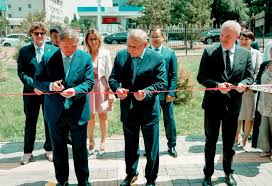Iran ready to share primary healthcare experiences with Pakistan: Saeed Namaki

Tehran: Iranian Minister of Health and Medical Education Saeed Namaki said that with the capabilities Iran has in the primary healthcare system as well as the facilities at the Medical Sciences and Pharmacy Universities, Tehran is ready to help Pakistan and provide these experiences to Pakistani health teams.
Namaki said on Tuesday in his meeting with Pakistani counterpart while congratulating Dr Zafar Mirza’s appointment as Pakistan’s Minister of Health, noted that Pakistan has its own problems and selecting a prominent global health expert such as Dr. Zafar Mirza could pave the way to solve Pakistan’s problems.
Iranian official went on to say that Zafar Mirza is aware of the capabilities and problems of the country of Iran, and as a friendly and neighbor country of Pakistan, “we are aware of capabilities and problems in the field of health” in Pakistan.
Both of “us as experts in the field know that it is not possible to solve health problems alone without the participation of two neighboring countries”. For example, about three decades ago, when “we were planning to launch a malaria eradication plan, we went with the permission of the Pakistani government from Balochistan to check the Anafel mosque flight radius”.
The Minister of Health reiterated that it is a pleasure that some of our advisers, such as Dr. Asaii, has spent a long time as a representative in countries such as Pakistan, and therefore in addition to religious, cultural and border sharing, we have a special emotional sharing on the part of our partners to help Pakistan, the IRNA reported Tuesday.
We understand the country of Pakistan in solving health problems, the Iranian Health and Medical Minister said. Although Dr. Zafar Mirza is a technical person at global health, I need to emphasize a few things as a colleague, friend, and brother. The first point is that you must know that moving to universal coverage of occupational health is difficult and sometimes impossible before deploying primary healthcare. So I recommend speeding up and we will also help you set up a primary healthcare system in Pakistan as infrastructure as soon as possible.
“I recently said during a meeting with the Prime Minister of Pakistan that you have to do something before creating public insurance coverage, otherwise the insurance coverage will be extremely expensive for you and will be almost impossible. I advise you never to make this mistake. Electronic health records, family medicine, and clinical guides are the first features before steps need to be taken.
He also said about drugs that we produce 97 percent of drugs inside the country and about 26 percent of the healthcare system’s spending basket is allocated to medicine. Currently, 97 percent of our domestically-produced medicine controls 70 percent of the market. While 3 percent of our imported drugs consume 30 percent of our pharmaceutical resources. I recommend that you go for generic and inexpensive drugs instead of importing expensive branded drugs that cost 2 to 3 times more; Iran can help Pakistan a lot.
Both sides also agreed to enhance cooperation in diverse areas. It was shared that a 14 member delegation of health experts from all over Pakistan will be visiting Iran in November for two weeks to study the country’s health system. Likewise, Iranian side was invited to send its health experts to Pakistan on a mutually agreed date.
Dr. Zafar Mirza shared that his Ministry has reached agreement with Ministry of Interior to provide space and facilities at Taftan border between Iran and Pakistan where a health post will be established to cater to the needs of the travellers including the Zaireen. The two sides also agreed to cooperate in the fields of Pharmaceuticals and medical education.





